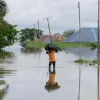Extreme weather events are becoming increasingly frequent, affecting our daily lives and economies. Whether it’s intense heat, severe cold, floods, or wildfires, the impact of a volatile climate is unmistakable.
These weather events go beyond mere inconvenience—they have profound economic repercussions. Companies are now factoring in climate risks when deciding where to set up or expand operations.
Jeremy Porter of the First Street Foundation, an organization that assesses climate risks, notes that businesses are choosing locations based on their exposure to climate-related threats.

For the 2023 rankings, the assessment includes data from First Street on property risks from extreme heat, wind, flooding, and wildfires, as well as information from NOAA’s Climate Extremes Index and the Department of Energy’s renewable energy statistics.
Among the states at greatest risk, Louisiana tops the list. Known for its vulnerability to hurricanes, Louisiana experienced severe impacts from Hurricane Ida in 2021, which caused significant damage and loss of life. The state’s low score reflects its high exposure to climate risks and minimal use of renewable energy.
Florida also ranks high for climate risk, with insurance companies withdrawing from the state due to the high costs of natural disasters. This has led to a substantial increase in homeowner insurance premiums.
California, despite its commitment to renewable energy, struggles with severe weather challenges like droughts and floods. Similarly, states like South Carolina, Alabama, and New York face climate-related issues, from hurricanes to extreme snowfall.
These rankings highlight how essential it is for states to adapt to and mitigate climate risks while transitioning to sustainable energy solutions.

